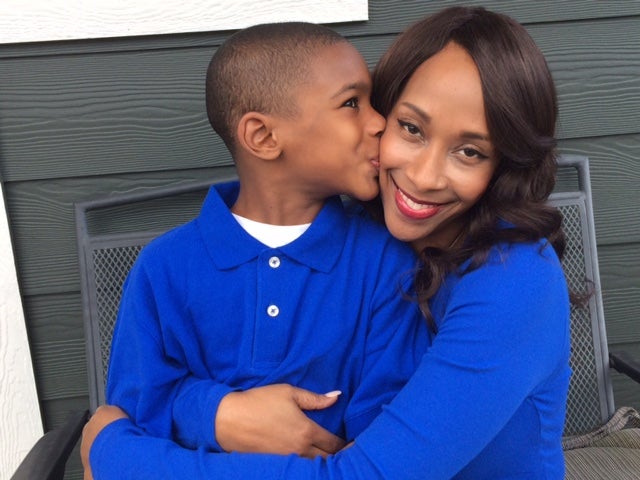
God is punishing me for being greedy. I typed those words in an online discussion board the day I learned my son was autistic.
I already have three healthy children and I just had to have one more. I said this to myself over and over again while pounding my fist into my head.
I don’t know how long I sat in front of the screen. Messages appeared with words of encouragement. Sentences were being sent to me that read, it’s not your fault, Sharisse, but I wasn’t ready to be rational. I was in shock. I was in pain. I was alone except for my laptop, and the almost three-year-old son I adored who stood beside me. The one I’d done nothing but loved and hug and was told I kissed so much I was going to suffocate who suddenly felt like a stranger to me with those four words from his developmental pediatrician, your son has autism.
If you watched The Toni Braxton Biopic, Unbreak My Heart, you know one of the more powerful moments (and there were plenty) is when she learned her son had autism. As a mom of an autistic son, I can relate to that scene, as I’m sure many mothers with autistic children can. But perhaps even more than that instant, I understood the initial feeling of denial, that overwhelming terror and crippling helplessness when as parents we’re given any news about our children that we’re unprepared to hear. As caregivers, we often believe that we know what’s best for our offspring. That we and we alone can be the ones to save them should they ever need to be saved. And if we’re confronted with something that we fear we can’t defend them from or the lack of knowledge to do so we turn that panic inward until it displays as denial. Most of this is done unconsciously but this is exactly when we can do the most damage to the little ones we love most.
When my youngest son started showing signs that something was wrong I was blind to them. I had every excuse in the world for why he didn’t speak much more than baby talk by his second birthday. I didn’t even realize they were excuses. “Oh, he’s just quiet,” I’d say. “He has a big sister who doesn’t let him talk,” and people just laughed. I knew as an educator it was dangerous to compare his development to my older sons because every child developed differently. Yet, being an educator allowed me to beat myself up even more once he was diagnosed. While it is true that autism had spiked in the recent years and double in numbers at an alarming rate especially in boys, it was on the rise in African American boys. I was embarrassed to be caught off guard and know so little about a disorder that would govern my life.
To add to the difficulty I felt that I was in the battle alone.
My husband, a proud, southern, military man, who earned an advanced degree in science, couldn’t wrap his mind around what was being said about his baby boy. So he ignored it and left everything to me.
I was overwhelmed by thought s of a toddler who could be aggressive and whom doctors informed would be in my care for my lifetime. The responsibility, weight and cost of taking care of autistic child was overwhelming despite how much love there is. I’d skated with depression in the past and was afraid to fall back into unsafe habits so I made attempts to reach out to friends. But parenting a child on the spectrum is often times isolating, which adds to the difficulty. I talked. I cried. I got angry and then I became resourceful. I loved my son. He was literally my heart. I wasn’t giving him over to anything a fight. We were going to be in in together. Within weeks professionals returned my calls and emails to set up assessment appointments.
No question I had went unanswered. If the licensed individuals I spoke with didn’t provide the information I needed I researched it myself. I made observations and took notes on my child’s moods, behaviors, eating and sleeping patterns.
I won’t lie to you, being the parent of a child with autism is challenging. My son resisted, had regular tantrums, meltdowns, and participated in behavior that embarrassed most people but I didn’t let it deter me. I treat every day as a new day and understand that he is also working just as hard as I am. He actually works harder. All good parenting requires effort, extreme patience and love. Parenting a child with different abilities has no contrast there. I’ve also found that knowledge truly is power and learning and tapping into your resources is worth its weight in gold. In our family, partially funded insurance programs like Applied Behavioral Analysis (ABA) services, respite programs and help from extended family has made all the difference in the world.
My son has made outstanding progress with some inevitable setbacks. Overall his prognosis is magnificent. He is one of the most considerate, generous, caring and loving children I know, not to mention brilliant. Yes I might be biased but if you spoke to his teachers I bet they’d agree.
Sharisse Tracey is a writer, educator, mother of four and Army wife. Her family is currently stationed in New York where she’s working on her memoir. Follow her on Twitter @SharisseTracey.